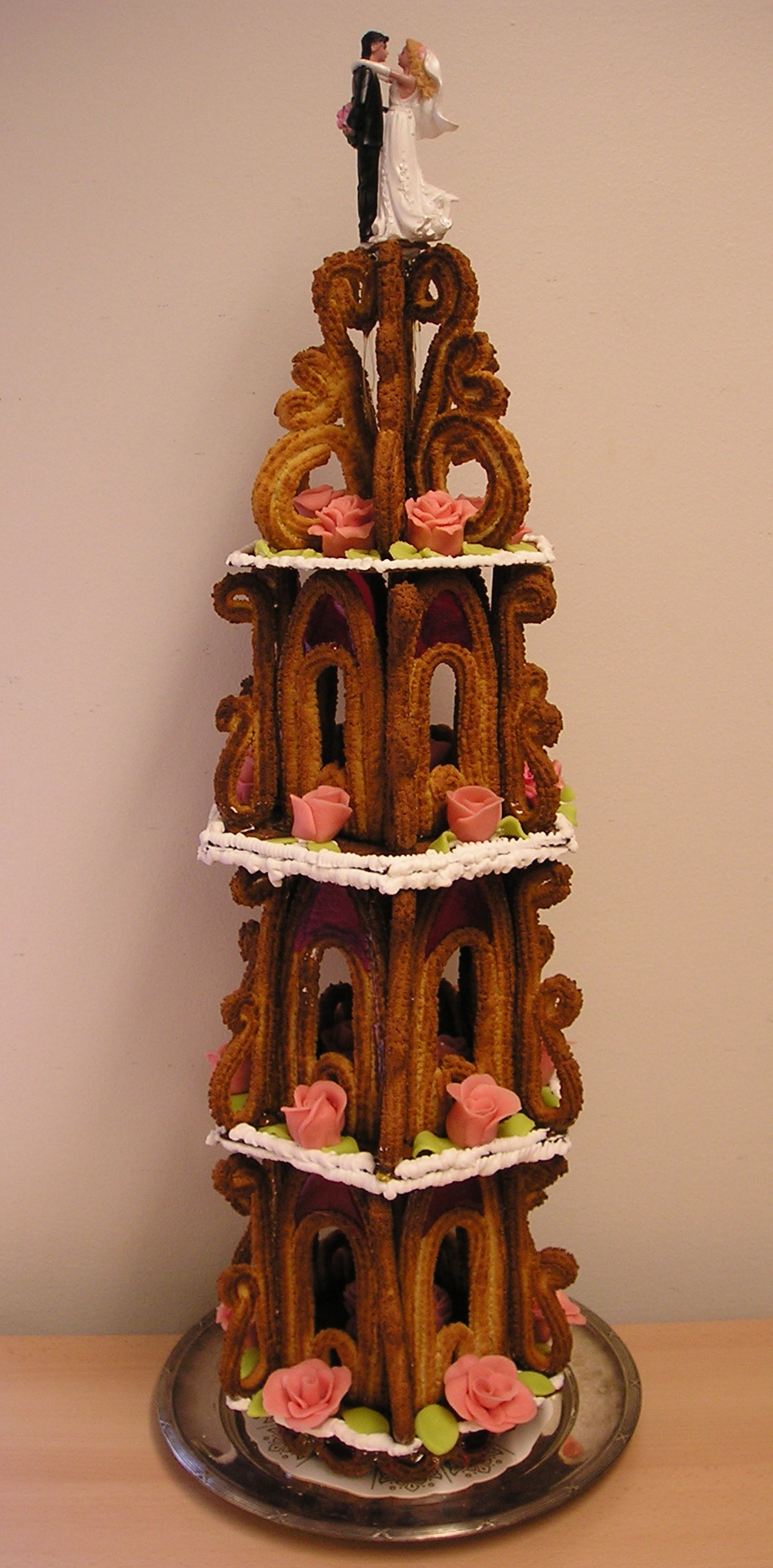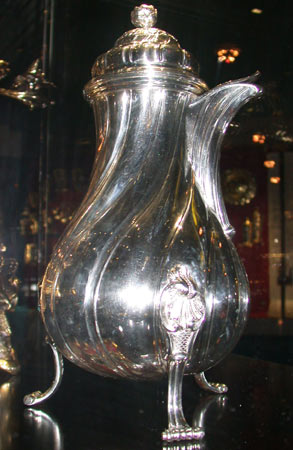|
Karol Wedel
Karl Ernst Wedel (February 7, 1813 – June 17, 1902) was a Polish Confectionery, confectioner of the Wedel family, who settled in Warsaw. Early life He was a member of the Evangelical-Augsburg Church in Poland. Wedel came to Warsaw at the beginning of 1845 and began to work with Karl Grohnert, who was an owner of a confectionery store at 12 Piwna Street. The collaboration between them was a success and won them a large group of loyal customers. Soon afterwards, around 1851, Wedel became financially independent and opened his own store at 12 Miodowa Street, and next door, a steam-powered factory making chocolate. His company, E.Wedel would grow into one of the leading confectionery companies in Poland. A year later, he introduced his widely popular "karmelki smietankowe" ("cream caramels"); the caramels' success was aided by an advertising campaign in "Kurier Warszawski" daily newspaper. Another product made popular by Wedel was drinking hot chocolate, chocolate. The store wa ... [...More Info...] [...Related Items...] OR: [Wikipedia] [Google] [Baidu] |
Confectionery
Confectionery is the art of making confections, which are food items that are rich in sugar and carbohydrates. Exact definitions are difficult. In general, however, confectionery is divided into two broad and somewhat overlapping categories: bakers' confections and sugar confections. The occupation of confectioner encompasses the categories of cooking performed by both the French ''patissier'' (pastry chef) and the ''confiseur'' (sugar worker). Bakers' confectionery, also called flour confections, includes principally sweet pastries, cakes, and similar baked goods Baking is a method of preparing food that uses dry heat, typically in an oven, but can also be done in hot ashes, or on hot stones. The most common baked item is bread but many other types of foods can be baked. Heat is gradually transferred .... Baker's confectionery excludes everyday Bread, breads, and thus is a subset of products produced by a baker. Sugar confectionery includes candies (also called '' ... [...More Info...] [...Related Items...] OR: [Wikipedia] [Google] [Baidu] |
Wedel Family
The House of Wedel (or Wedell) is an old and distinguished German nobility, German noble family, from Stormarn (gau), Stormarn in what is now Schleswig-Holstein. The family members held the title of Fürst#Use of the title in German, Prince, Graf, Count and Freiherr, Baron. History The family is first mentioned in records through ''Heinricus'', ''Hasso'' and ''Reimbernus de Wedele'' in 1212, and traces its familial line to the monastery ''Vogt'' Heinrich, of the monastery "Novum Monasterium“, who is mentioned on 13 September 1149 in Ottenbüttel (Steinburg, Schleswig-Holstein). In December 1302 the brothers Heinrich, Johannes and Reinbert recorded that their uncle Reinhard the Elder was selling the village of Spitzerdorf to the Hamburg cathedral chapter in their presence and with their consent. Three brothers from the family appear in 1212 as witnesses in a record by Heinrich von Barmstede. A member of the family was captured after the second battle of Uetersen in 1306, breaking ... [...More Info...] [...Related Items...] OR: [Wikipedia] [Google] [Baidu] |
Warsaw
Warsaw ( pl, Warszawa, ), officially the Capital City of Warsaw,, abbreviation: ''m.st. Warszawa'' is the capital and largest city of Poland. The metropolis stands on the River Vistula in east-central Poland, and its population is officially estimated at 1.86 million residents within a greater metropolitan area of 3.1 million residents, which makes Warsaw the 7th most-populous city in the European Union. The city area measures and comprises 18 districts, while the metropolitan area covers . Warsaw is an Alpha global city, a major cultural, political and economic hub, and the country's seat of government. Warsaw traces its origins to a small fishing town in Masovia. The city rose to prominence in the late 16th century, when Sigismund III decided to move the Polish capital and his royal court from Kraków. Warsaw served as the de facto capital of the Polish–Lithuanian Commonwealth until 1795, and subsequently as the seat of Napoleon's Duchy of Warsaw. Th ... [...More Info...] [...Related Items...] OR: [Wikipedia] [Google] [Baidu] |
Evangelical-Augsburg Church In Poland
The Evangelical Church of the Augsburg Confession in the Republic of Poland ( pl, Kościół Ewangelicko-Augsburski w Rzeczypospolitej Polskiej) is a Lutheran denomination and the largest Protestant body in Poland with about 61,000 members and 133 parishes. History The Evangelical Church of the Augsburg Confession stems from the Reformation which began in October 1517. The first Lutheran sermons took place in 1518, and in 1523 the first Lutheran dean, Johann Heß, was called to the city of Breslau, whence Lutheranism spread through the Polish lands. In interwar Poland the Evangelical-Augsburg church was the largest Protestant denomination, with about half a million followers, but unlike in post-WWII Poland it was not the only Lutheran church in the country. Ciecieląg, Jóźwiak and Godfrejów-Tarnogórska, p. 54. It competed for the hearts of Lutherans living in the territory of the revived Polish state with the in Greater Poland (part of the former Prussian territory), ... [...More Info...] [...Related Items...] OR: [Wikipedia] [Google] [Baidu] |
Karl Grohnert
Karl may refer to: People * Karl (given name), including a list of people and characters with the name * Karl der Große, commonly known in English as Charlemagne * Karl Marx, German philosopher and political writer * Karl of Austria, last Austrian Emperor * Karl (footballer) (born 1993), Karl Cachoeira Della Vedova Júnior, Brazilian footballer In myth * Karl (mythology), in Norse mythology, a son of Rig and considered the progenitor of peasants (churl) * ''Karl'', giant in Icelandic myth, associated with Drangey island Vehicles * Opel Karl, a car * ST ''Karl'', Swedish tugboat requisitioned during the Second World War as ST ''Empire Henchman'' Other uses * Karl, Germany, municipality in Rhineland-Palatinate, Germany * ''Karl-Gerät'', AKA Mörser Karl, 600mm German mortar used in the Second World War * KARL project, an open source knowledge management system * Korean Amateur Radio League, a national non-profit organization for amateur radio enthusiasts in South Korea * KARL, ... [...More Info...] [...Related Items...] OR: [Wikipedia] [Google] [Baidu] |
Kurier Warszawski
The ''Kurier Warszawski'' (or ''Warsaw Courier'') was a daily newspaper printed in Warsaw, Poland from 1821 to 1939, with two editions daily from 1873. It was selling 4,000 copies in 1868, and over 20,000 copies after 1883.Bolesław Klimaszewski, ''An Outline History of Polish Culture'', 1984, p.216 See also *''Nowy Kurier Warszawski ''Nowy Kurier Warszawski'', initially ''Nowy Kurjer Warszawski'' ("New Courier of Warsaw") was a German propaganda newspaper issued in the occupied Poland during World War II. Its name was coined after a popular pre-war newspaper ''Kurier Warsza ...'' References 1821 establishments in Poland 1939 disestablishments in Poland Defunct newspapers published in Poland Newspapers published in Warsaw Polish-language newspapers Publications established in 1821 Publications disestablished in 1939 Daily newspapers published in Poland {{Poland-newspaper-stub ... [...More Info...] [...Related Items...] OR: [Wikipedia] [Google] [Baidu] |
Hot Chocolate
Hot chocolate, also known as hot cocoa or drinking chocolate, is a heated drink consisting of shaved chocolate, melted chocolate or cocoa powder, heated milk or water, and usually a sweetener like whipped cream or marshmallows. Hot chocolate made with melted chocolate is sometimes called drinking chocolate, characterized by less sweetness and a thicker consistency. The first chocolate drink is believed to have been created by the Maya around 2,500–3,000 years ago, and a cocoa drink was an essential part of Aztec culture by 1400 AD, by which they referred to as . The drink became popular in Europe after being introduced from Mexico in the New World and has undergone multiple changes since then. Until the 19th century, hot chocolate was used medicinally to treat ailments such as liver and stomach diseases. Hot chocolate is consumed throughout the world and comes in multiple variations, including the spiced of Latin America, the very thick served in Italy and served i ... [...More Info...] [...Related Items...] OR: [Wikipedia] [Google] [Baidu] |
1813 Births
Events January–March * January 18–January 23 – War of 1812: The Battle of Frenchtown is fought in modern-day Monroe, Michigan between the United States and a British and Native American alliance. * January 24 – The Philharmonic Society (later the Royal Philharmonic Society) is founded in London. * January 28 – Jane Austen's '' Pride and Prejudice'' is published anonymously in London. * January 31 – The Assembly of the Year XIII is inaugurated in Buenos Aires. * February – War of 1812 in North America: General William Henry Harrison sends out an expedition to burn the British vessels at Fort Malden by going across Lake Erie via the Bass Islands in sleighs, but the ice is not hard enough, and the expedition returns. * February 3 – Argentine War of Independence: José de San Martín and his Regiment of Mounted Grenadiers gain a largely symbolic victory against a Spanish royalist army in the Battle of San Lorenzo. * February ... [...More Info...] [...Related Items...] OR: [Wikipedia] [Google] [Baidu] |
1902 Deaths
Nineteen or 19 may refer to: * 19 (number), the natural number following 18 and preceding 20 * one of the years 19 BC, AD 19, 1919, 2019 Films * ''19'' (film), a 2001 Japanese film * ''Nineteen'' (film), a 1987 science fiction film Music * 19 (band), a Japanese pop music duo Albums * ''19'' (Adele album), 2008 * ''19'', a 2003 album by Alsou * ''19'', a 2006 album by Evan Yo * ''19'', a 2018 album by MHD * ''19'', one half of the double album ''63/19'' by Kool A.D. * ''Number Nineteen'', a 1971 album by American jazz pianist Mal Waldron * ''XIX'' (EP), a 2019 EP by 1the9 Songs * "19" (song), a 1985 song by British musician Paul Hardcastle. * "Nineteen", a song by Bad4Good from the 1992 album '' Refugee'' * "Nineteen", a song by Karma to Burn from the 2001 album ''Almost Heathen''. * "Nineteen" (song), a 2007 song by American singer Billy Ray Cyrus. * "Nineteen", a song by Tegan and Sara from the 2007 album '' The Con''. * "XIX" (song), a 2014 song by Slipk ... [...More Info...] [...Related Items...] OR: [Wikipedia] [Google] [Baidu] |
Polish Businesspeople
Polish may refer to: * Anything from or related to Poland, a country in Europe * Polish language * Poles, people from Poland or of Polish descent * Polish chicken *Polish brothers (Mark Polish and Michael Polish, born 1970), American twin screenwriters Polish may refer to: * Polishing, the process of creating a smooth and shiny surface by rubbing or chemical action ** French polishing, polishing wood to a high gloss finish * Nail polish * Shoe polish * Polish (screenwriting), improving a script in smaller ways than in a rewrite See also * * * Polonaise (other) A polonaise ()) is a stately dance of Polish origin or a piece of music for this dance. Polonaise may also refer to: * Polonaises (Chopin), compositions by Frédéric Chopin ** Polonaise in A-flat major, Op. 53 (french: Polonaise héroïque, lin ... {{Disambiguation, surname Language and nationality disambiguation pages ... [...More Info...] [...Related Items...] OR: [Wikipedia] [Google] [Baidu] |
German Lutherans
The religion of Protestantism, a form of Christianity, was founded within Germany in the 16th-century Reformation. It was formed as a new direction from some Roman Catholic principles. It was led initially by Martin Luther and later by John Calvin. History The Protestant Reformation began with the publication of the ''Ninety-five Theses'' by Augustinian monk Martin Luther in 1517. The key element of this religious upheaval was a break from Roman Catholicism's emphasis on tradition, favouring a focus on the Bible. The lasting effects of Luther's Protestant movement within Germany was to question its existing power structures, imploring lay nobles for church reformation, critiquing the Roman mass, sacraments and seeking to reaffirm the importance of faith in good works. His subsequent excommunication from the Church ensured Germany had an ideological divide between Protestant sects and other Christian denominations. Another prominent reformer, Martin Bucer, introduced the rite ... [...More Info...] [...Related Items...] OR: [Wikipedia] [Google] [Baidu] |







